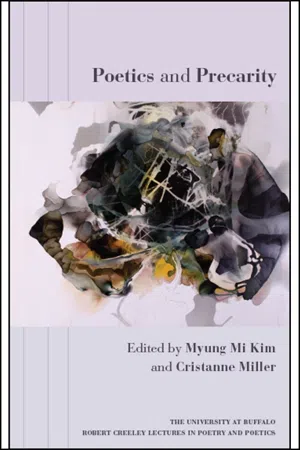
The University at Buffalo Robert Creeley Lectures in Poetry and Poetics
- 248 pages
- English
- ePUB (mobile friendly)
- Available on iOS & Android
The University at Buffalo Robert Creeley Lectures in Poetry and Poetics
About This Book
At a time when wars, acts of terrorism, and ecological degradation have intensified and isolationism, misogyny, and ethnic divisiveness have been given distinctively more powerful voice in public discourse, language itself often seems to have failed. The poets and critics in this book argue that language has the potential to address this increasing level of discord and precarity, and they negotiate ways to understand poetics, or the role of the poetic, in relation to language, the body politic, the human body, breath, the bodies of the natural environment, and the body of form. Poetry makes urgent issues audible and poetics helps to theorize those issues into critical consciousness. Poetry also functions as a cry to protest late capitalist imperialism, misogyny, racism, climate change, and all the debilitating conditions of everyday life. Hubs of concern merge and diverge; precarity takes differently gendered, historied, embodied, geopolitical manifestations. The contributors articulate a poetics that renders what has not yet been crystallized as discourse into fields of force. They also acknowledge the beauties of sound, poetry, and music, and celebrate the power of community, marking the surge of energy that can occur at a particular place at a particular moment. Ultimately, Poetics and Precarity fosters further conversations that will imagine the concerns of poetics as a continuously emerging field.
Frequently asked questions
Information
A PERSONAL INTRODUCTION TO A PUBLIC HISTORY
Table of contents
- Cover
- Title
- Copyright
- Contents
- List of Figures
- Acknowledgments
- Introduction
- Breath and Precarity: The Inaugural Robert Creeley Lecture in Poetry and Poetics
- The Ga(s)p
- Precarity Shared: Breathing as Tactic in Air’s Uneven Commons
- On Not Missing It
- Here and Elsewhere: Creeley’s Notions of Community and Teaching as Circulation
- Constructive Alterities & the Agonistic Feminine
- Precarity, Poetry, and the Practice of Countermapping
- Supine, Prone, Precarious
- The Opening of the (Transnational Battle) Field
- Appendix 1: Poetry in the Making: A Bibliography of Publications by Graduate Students in the Poetics Program, 1991–2016
- Appendix 2: Schedule for the Robert Creeley Lecture and Celebration of Poetry, April 7–10, 2016
- Appendix 3: “Poetics: (The Next) 25 Years” Conference, Seminar Topics and Participants, April 9–10, 2016
- List of Contributors
- Index
- Back Cover